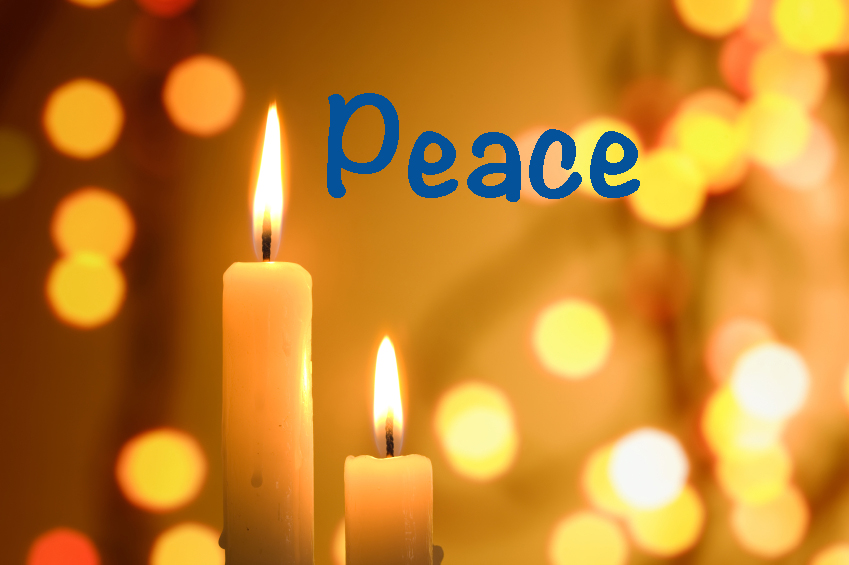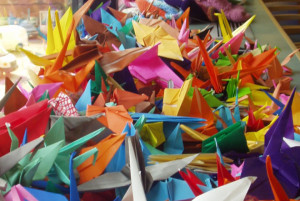This Sunday marks the second Sunday of the season of Advent in our Christian tradition. We’ll light the candle of Peace. Last week we focused on Hope.
Yet we struggle to find either blessing, especially with all the headlines in our own country and around the world. Reading this week’s scriptures, I was reminded that Hebrew and Gospel narratives are rooted in times of historical and political upheaval. Not so different from now.
For the next few weeks, we fill the winter dark with the combined brilliance — and energy — of many small bright lights. Just about now, we are sorely in need of those flames and their promises: Hope, Peace, Joy and Love.
Can We Get There?
 Yet I admit that sometimes the promises of the Advent candles seem hard to believe in.
Yet I admit that sometimes the promises of the Advent candles seem hard to believe in.
After all, Advent is a season of anticipating the return of an embodied love —Emmanuel, God with Us — into the world. Yet this holy season comes just when Love of different types of bodies surely seems in short supply. And Joy seems to be missing from the homes and lives of people surviving on the margins, grieving and wondering what equality ought to feel like. In this Advent season, justice and mercy for vulnerable parts of our population seems unavailable. This is a season when Hope is stretched thin and Peace of any kind — personal or political — seems beyond reach.
Just about now, the dreams of Advent seem inaccessible.
Yet as Christians, I would argue it is precisely when all seems impossible, during the coldest, darkest season of the year, we are meant to keep watch through the longest night, literally and symbolically. As in the text of Baruch, we are called to keep vigil. To expect more and to work together to create more. This season of preparation and active waiting becomes an invitation, here and now, to believe in and build up the promises of Advent: Hope, Peace, Joy and Love.
And I ask, how we can help to bring Advent promises to fruition for ourselves and others? Let’s wonder, along with the prophets whose words we read, about how to make available the virtues of the season to those cut off from such gifts of the season, including members of our own community as well as citizens throughout our nation and world.
This Sunday we consider the second Advent candle: Peace. Assuredly, we need peace of all kinds.
- Inner peace.
- Inter-relational peace.
- International peace.
- Peace beyond understanding.
In this week’s passage from Luke, Zechariah’s song of praise, called the Benedictus, points us toward the balance between redemption for an entire community and salvation for an individual soul. That’s a good starting point as we consider the different forms of peace. All of these forms of peace are significant.
Personal and Inner Peace
Let’s start with something immediate: ourselves. That sounds easy, but it’s not. After all, we’re works in progress, often wanting or wishing to be more, or less, or different, or other. Not satisfied with ourselves. 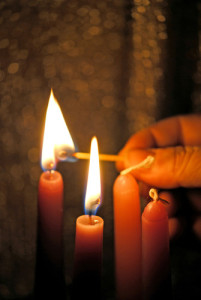
What might lead to individual or inner peace? We are asked to take stock internally. To prepare ourselves for the renewal of God’s presence within our own lives. What lights the flame inside your heart and mind? What purpose or passion keeps it burning? What sparks it to dangerous proportions, blazing out of control? What hushes it to embers or possibly ashes, to silence or absence? What breathes it leaping back to life?
Striving for personal peace, perhaps we undertake a different sort of preparation. Maybe we are called, in this instance, not to the labor of a busy holiday ‘to-do’ list, but the respite of a compassionate ‘to-be’ list.
A to-be list? That might mean slowing down. Just being present in this moment, and showing up in our own lives. Becoming reflective. Daring to be more self-aware. Such personal transformation cultivates balance, centeredness, wholeness and peace in our psychological health, our emotional being, and/or our bodily self-care. Maybe it’s taking on a new practice, like yoga or prayer. Maybe it’s relinquishing one too many activities.
For me, for instance, this might mean staying away from savory carbs and too many cookies. And allowing time to read and breathe and walk, rather than rushing from one obligation to the next.
Welcoming this focus on peace, perhaps we let go of harmful ways of being. Instead we reach for sustainable ways of being. We seek restoration and renewal. Less doing. More being.
Relational Peace
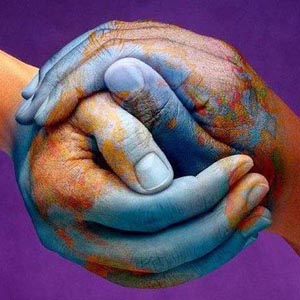 Peace may also be understood as relational. This doesn’t presume that we live without conflict and tension, but it anticipates that we resist and interrupt cycles of abuse and violence and coercion and oppression. Instead we take steps toward relational integrity in a safe and healthy way, with boundaries and communication and respect and reciprocity, for instance.
Peace may also be understood as relational. This doesn’t presume that we live without conflict and tension, but it anticipates that we resist and interrupt cycles of abuse and violence and coercion and oppression. Instead we take steps toward relational integrity in a safe and healthy way, with boundaries and communication and respect and reciprocity, for instance.
- This may be reaching out to someone. Seeking reconciliation. Asking forgiveness. Offering understanding. Connecting.
- This may require saying good-bye. Parting ways. Giving space. Resolving and ending relationships.
- This might be maintenance. Just showing up. Being consistent and present in small and meaningful doses.
Ultimately, just as we are asked to be in right relationship with ourselves and with other people in our lives, we are also asked to be in right relationship with God. Part of this Advent season is simply the reminder that we are not alone in our waiting and our work. God is already with us. Welcome God into every part of life … not just an hour on Sunday, or the lighting of a candle at dinner, but into work, study and play.
Communal & Creational Peace
Along with personal preparation for peace, we look to the larger world. We are called to seek fulfillment of Advent’s gifts — Hope, Peace, Joy and Love — not just for ourselves, but for everyone.
Peace includes redemption of communities and creation. Luke’s text, which names emperors and governors and kings and priests, reminds us that we are only the latest generation born into a complicated intersection of social, cultural, geographical, economic, political and historical climates. Knowing this about ourselves, we are called to consider and act on our ethical relationship to other people and to God’s creation. We are accountable for the systems and institutions of the societies in which we live.
Without question, this is a world currently under siege by oppression and violence, certainly in other parts of the globe, but also at our own borders, on our own streets, and in our own homes.
Ultimately, as we are asked to imagine the world’s transformation, that requires that all people enjoy full access and membership to circles of belonging that deliver a basic level of wellbeing tied to our common welfare. It also implies environmental equity and care. That could be interpreted as interrupting unjust cycles that trouble our society. We can support more redemptive and merciful strategies that address social and environmental issues such as jobs and economics, education, housing and shelter, food and water, justice, and health of body and mind and spirit. Advocacy for such systemic transformation is one form of working to fulfill Advent promises so that everyone may benefit from them.
So the work of Advent starts by waking up to the fact that there are environmental and societal problem at all. And they are not just someone else’s issues. They’re ours, too, and our God’s. The work to change the world belongs to all of us.
Our Role In Advent Preparations
Does that scale of transformation sound too overwhelming? In this season, competing demands are made on each of us. It becomes overwhelming: all the urgent needs, good causes, and life-changing campaigns.
In response, sometimes I’m unable to do anything at all. Or find that I’m attempting to do too much. Yet we’re only asked to take up the work that we’re able and called to do. No more, no less.
Advent offers a chance to listen to the Spirit within (pay attention to the inner/internal peace) as you seek an answer to what work you should take up. As I wondered earlier, what kindles your flame and breathes life into you, gives you energy and purpose? Pay attention to that light. Let it move and guide you in this season and beyond it.
Yes, we are called to be active in the world, but also to do so in a sustainable way. We may care, theoretically, for the whole world, but we can only serve and bear witness to some small piece of creation. Choose where you will give your love and time and energy. Let that be a start. And let it be enough.
The wealth of our faith community comes from its many experiences and gifts. After all, we are a world filled with many hands and feet. Altogether, with the Spirit’s wind blowing through our work and blessing us, we can do more than one person can ever contemplate.
What moves you? You aren’t asked to do it all. Yet you are invited to do something. During this season, people are holding up their hands. Lighting candles. Praying with hands, feet, and voices. Marching. Serving food. Sheltering each other. Rushing toward danger. Working with prisoners. Creating jobs. Educating. Speaking out. Lobbying for reform. Counseling troubled souls. Supporting sobriety and recovery. Funding alternative programs. Welcoming exiles and refugees of all kinds … others cut off from themselves or their lives and their histories and homes. Making safe places.
People are becoming sanctuary. People. Us.
Peace Beyond Understanding
As humans, we embody, imperfectly, the echo of the One promised to us: Emmanuel, God With Us. And despite all of our best efforts, the world remains in conflict and tension. It is uneasy and uncomfortable to live in these times.
We hope for peace on earth. Yet Christ promises, also, a peace the “world cannot give.”
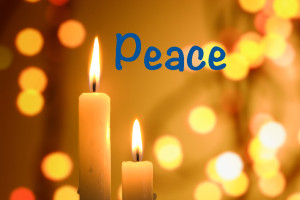 Our own labors and virtues may help to bring about change, yet the ideal transformation of the world – God’s “kingdom come on earth as it is in heaven” – will occur through God’s grace and power, in God’s own time.
Our own labors and virtues may help to bring about change, yet the ideal transformation of the world – God’s “kingdom come on earth as it is in heaven” – will occur through God’s grace and power, in God’s own time.
Meanwhile, what do we do, when Advent preparations seem futile? For a few weeks, we light candles in the winter and undertake preparations, without proof that we will see the reality of these promises in our times.
Like the prophets, we do what we can. And then we remain present, bearing witness and offering companionship, moved by love and compassion and justice. And we admit that we cannot fix it all. Not by ourselves. That power belongs to another.
So we light candles, believing in an embodied love that will not be denied and a grace that cannot be earned. The preparation of Advent, for this week, is to kindle the flame of peace:
- Peace in our own lives.
- Peace in our relationships with other people and with God.
- Peace in communities and for creation.
All these Advent blessings are born out of the ultimate promise: the Messiah whose coming brings a peace beyond understanding, a peace beyond words, a peace that changes everything.
###

